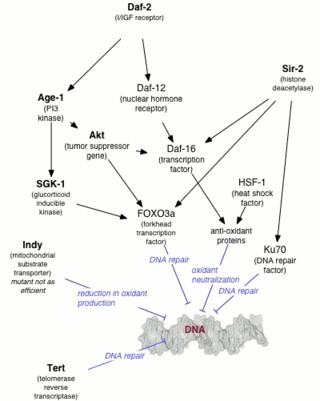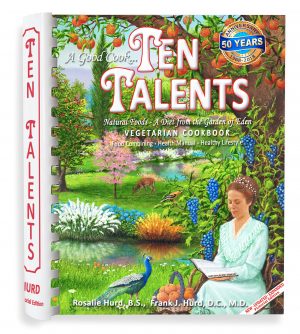Related Research Articles

The soybean, soy bean, or soya bean is a species of legume native to East Asia, widely grown for its edible bean, which has numerous uses.

Life extension is the concept of extending the human lifespan, either modestly through improvements in medicine or dramatically by increasing the maximum lifespan beyond its generally-settled biological limit of around 125 years. Several researchers in the area, along with "life extensionists", "immortalists", or "longevists", postulate that future breakthroughs in tissue rejuvenation, stem cells, regenerative medicine, molecular repair, gene therapy, pharmaceuticals, and organ replacement will eventually enable humans to have indefinite lifespans through complete rejuvenation to a healthy youthful condition (agerasia). The ethical ramifications, if life extension becomes a possibility, are debated by bioethicists.
Maximum life span is a measure of the maximum amount of time one or more members of a population have been observed to survive between birth and death. The term can also denote an estimate of the maximum amount of time that a member of a given species could survive between birth and death, provided circumstances that are optimal to that member's longevity.
Calorie restriction mimetics (CRM), also known as energy restriction mimetics, are a hypothetical class of dietary supplements or drug candidates that would, in principle, mimic the substantial anti-aging effects that calorie restriction (CR) has on many laboratory animals and humans. CR is defined as a reduction in calorie intake of 20% to 50% without incurring malnutrition or a reduction in essential nutrients. An effective CRM would alter the key metabolic pathways involved in the effects of CR itself, leading to preserved youthful health and longer lifespan without the need to reduce food intake. The term was coined by Lane, Ingram, Roth of the National Institute on Aging in a seminal 1998 paper in the Journal of Anti-Aging Medicine, the forerunner of Rejuvenation Research. A number of genes and pathways have been shown to be involved with the actions of CR in model organisms and these represent attractive targets for drug discovery and for developing CRM. However, no effective CRM have been identified to date.
Calorie restriction is a dietary regimen that reduces the energy intake from foods and beverages without incurring malnutrition. The possible effect of calorie restriction on body weight management, longevity, and aging-associated diseases has been an active area of research.
The Okinawa Centenarian Study is a study of the elderly people of Okinawa, Japan. The study, funded by Japan's ministry of health, is the largest of its kind ever carried out. Over the years, the scientists involved have had access to more than 600 Okinawan centenarians.
The CRON-diet is a nutrient-rich, reduced calorie diet developed by Roy Walford, Lisa Walford, and Brian M. Delaney. The CRON-diet involves calorie restriction in the hope that the practice will improve health and retard aging, while still attempting to provide the recommended daily amounts of various nutrients. Other names include CR-diet, Longevity diet, and Anti-Aging Plan. The Walfords and Delaney, among others, founded the CR Society International to promote the CRON-diet.
Enquiry into the evolution of ageing, or aging, aims to explain why a detrimental process such as ageing would evolve, and why there is so much variability in the lifespans of organisms. The classical theories of evolution suggest that environmental factors, such as predation, accidents, disease, and/or starvation, ensure that most organisms living in natural settings will not live until old age, and so there will be very little pressure to conserve genetic changes that increase longevity. Natural selection will instead strongly favor genes which ensure early maturation and rapid reproduction, and the selection for genetic traits which promote molecular and cellular self-maintenance will decline with age for most organisms.
Following is a list of topics related to life extension:

Cynthia Jane Kenyon is an American molecular biologist and biogerontologist known for her genetic dissection of aging in a widely used model organism, the roundworm Caenorhabditis elegans. She is the vice president of aging research at Calico Research Labs, and emeritus professor of biochemistry and biophysics at the University of California, San Francisco (UCSF).
The following outline is provided as an overview of and topical guide to life extension:

House Foods Corporation is one of Japan's largest food manufacturers and brands. It began in 1913 in Osaka as Urakami Shoten and began selling curry in 1926.
Ageing is the process of becoming older. The term refers mainly to humans, many other animals, and fungi, whereas for example, bacteria, perennial plants and some simple animals are potentially biologically immortal. In a broader sense, ageing can refer to single cells within an organism which have ceased dividing, or to the population of a species.
The reproductive-cell cycle theory posits that the hormones that regulate reproduction act in an antagonistic pleiotrophic manner to control aging via cell cycle signaling; promoting growth and development early in life in order to achieve reproduction, but later in life, in a futile attempt to maintain reproduction, become dysregulated and drive senescence. Rather than seeing aging as a loss of functionality as we get older, this theory defines aging as any change in an organism over time, as evidenced by the fact that if all chemical reactions in the body were stopped, no change, and thus no aging, would occur. Since the most important change in an organism through time is the chemical reactions that result in a single cell developing into a multicellular organism, whatever controls these chemical reactions that regulate cell growth, development, and death, is believed to control aging. The theory argues that these cellular changes are directed by reproductive hormones of the hypothalamic-pituitary-gonadal axis. Receptors for reproductive hormones have been found to be present in all tissues of the body. Thus, HPG axis hormones normally promote growth and development of the organism early in life in order to achieve reproduction. Hormones levels then begin to change in men around age 30 and more abruptly in women when they reach menopause, around age 50. When the HPG axis becomes unbalanced, cellular growth and development is dysregulated, and cell death and dysfunction can occur, both of which can initiate senescence, the accumulated damage to cells, tissues, and organs that occurs with the passage of time and that is associated with functional loss during aging.

Ragnar Berg was a Swedish-born biochemist and nutritionist who worked most of his adult life in Germany. He is best known for his theories on the importance of acid-base balance and inorganic minerals like calcium in the diet; later in life he endorsed vegetarianism and ways to prolong the human life span. He promoted an alkaline rich diet and also invented the alkaline dietary supplement Basica, which Volkmar Klopfer manufactured and marketed from 1925.

Genetics of aging is generally concerned with life extension associated with genetic alterations, rather than with accelerated aging diseases leading to reduction in lifespan.
Young blood transfusion refers to transfusing blood specifically from a young person into an older one with the intention of creating a health benefit. The efficacy and safety of young blood transfusions for anti-aging purposes remain a subject of debate in the scientific community, with limited clinical evidence in humans. There are also concerns of harm. While some preclinical studies on animals suggest potential benefits, there is a lack of robust clinical evidence to support its use in humans. The U.S. Food and Drug Administration, in 2019, cautioned "consumers against receiving young donor plasma infusions" stating that they are an "unproven treatment".

Ten Talents is a vegetarian and vegan cookbook originally published in 1968 by Rosalie Hurd and Frank J. Hurd. At the time, it was one of the few resources for vegetarian and vegan cooks. The cookbook promotes Christian vegetarianism and a Bible-based diet, in keeping with teachings of the Seventh-day Adventist Church. By 1991, the 750-recipe cookbook was entering its 44th printing and had sold more than 250,000 copies. An expanded edition with more than 1,000 recipes was issued in 2012.

Harry Willis Miller was an American physician, thyroid surgeon and Seventh-day Adventist missionary. Miller was a vegetarian and pioneer in the development of soy milk.
This timeline lists notable events in the history of research into senescence or biological aging, including the research and development of life extension methods, brain aging delay methods and rejuvenation.
References
- ↑ Clive M. McCay and Jeanette B. McCay - History of Work with Soyfoods, the New York State Emergency Food Commission, Improved Bread, and Extension of Lifespan (1927-2009): Extensively Annotated Bibliography and Sourcebook. Soyinfo Center. 2009. p. 55. ISBN 978-1-928914-27-3 . Retrieved 12 April 2013.
- ↑ McCay, C. M.; Crowell, Mary F. (November 1934). "Prolonging the Life Span". The Scientific Monthly. 39 (5): 405–414. Bibcode:1934SciMo..39..405M. JSTOR 15813.
- 1 2 Conboy MJ, Conboy IM, Rando TA (June 2013). "Heterochronic parabiosis: historical perspective and methodological considerations for studies of aging and longevity". Aging Cell. 12 (3): 525–530. doi:10.1111/acel.12065. PMC 4072458 . PMID 23489470.
{{cite journal}}: CS1 maint: multiple names: authors list (link) - 1 2 "Cornell Library Guide to the Clive McCay Papers, 1920-1967". Cornell Library. Retrieved 12 April 2013.
- ↑ Scudellari, Megan (January 21, 2015). "Ageing research: Blood to blood". Nature. 517 (7535): 426–29. Bibcode:2015Natur.517..426S. doi: 10.1038/517426a . PMID 25612035.
- ↑ United States. Congress. Senate. Committee on Labor and Public Welfare (1959). National Organizations in the Field of Aging: Hearings Before the Subcommittee on Problems of the Aged and Aging of the Committee on Labor and Public Welfare, United States Senate, Eighty-sixth Congress, First Session, August 4, 5, and 6, 1959. U.S. Government Printing Office. p. 232. Retrieved 12 April 2013.